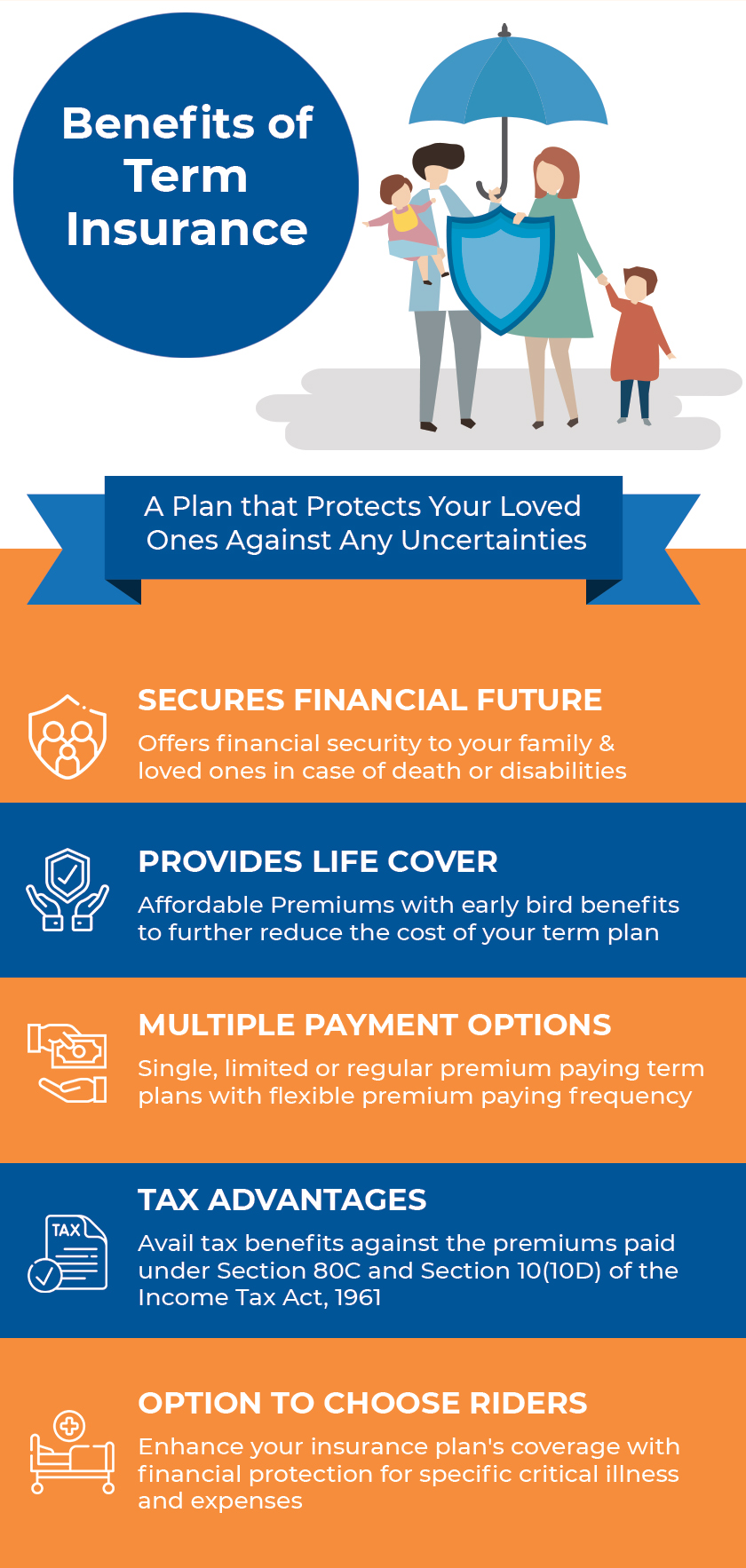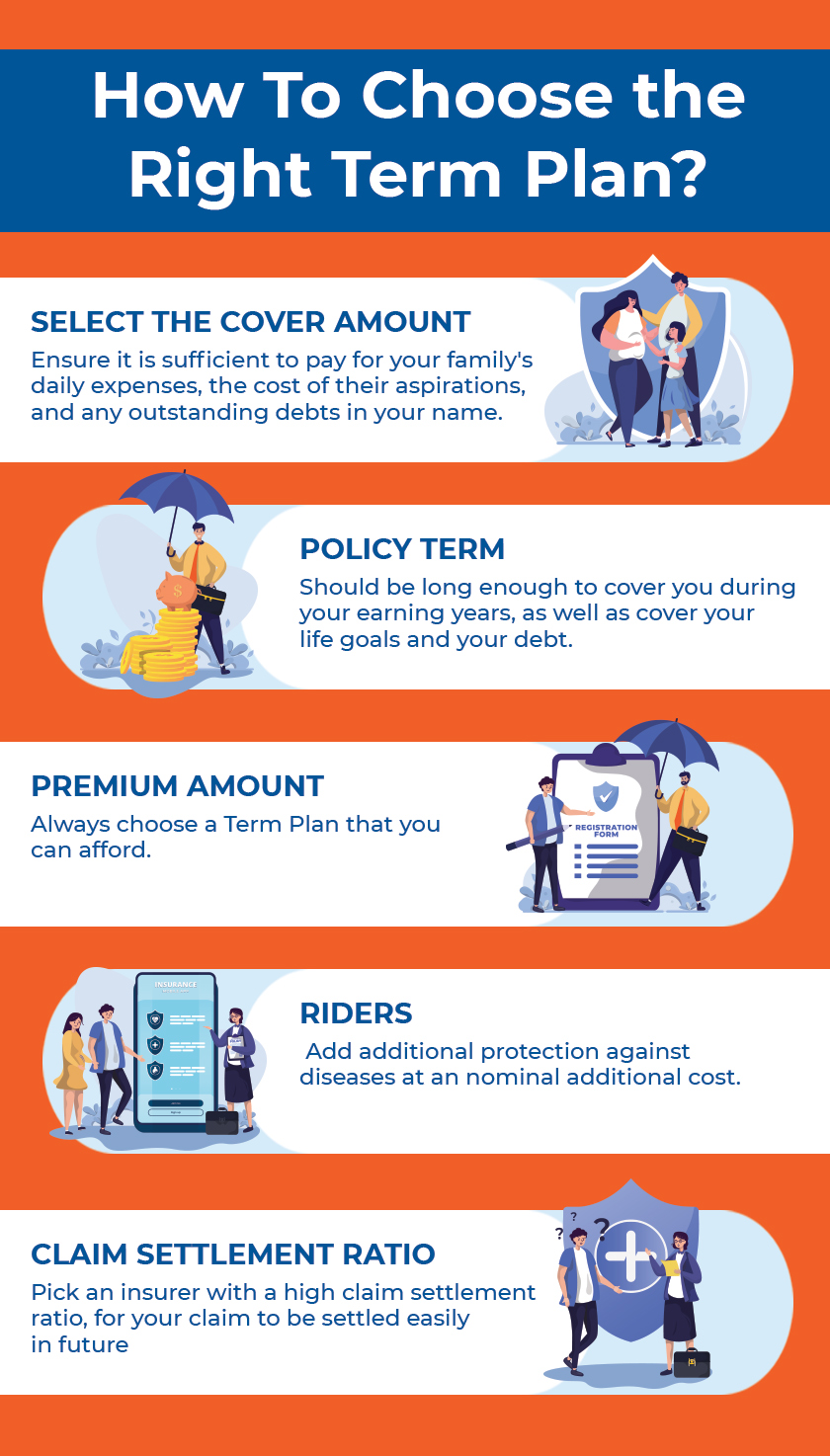What is Term Insurance?
Blog Title
5066 |
1/20/25 2:39 PM |
Term insurance is one of the most affordable forms of life insurance. With a term plan, you can provide financial security to your loved ones/nominee(s) by ensuring a death benefit payout in case of your unfortunate death. However, in exchange for this life cover, you must pay premiums to the life insurance provider.
What is a Term Insurance Plan
A term plan's life insurance coverage is active for a set period, that is determined at the time of purchasing the plan. This is known as the Policy Term. For example, it can be 10, 20, or 30 years. Furthermore, some term insurance plans may even provide life insurance coverage up to 100 years of age. A term policy is also called a pure life insurance policy, meaning that it does not include any investment/savings component.
Therefore, in the case of a standard term plan, if you live past the policy term, you will not receive any returns/maturity benefits. However, if you pass away while the policy is still in effect, the insurer will pay out the assured sum to your nominees. The nominees can then utilize this sum for numerous purposes, like settling any outstanding debts, covering routine expenditures, and funding their life goals.
Importance of Term Insurance
Imagine this: In your four-person family, you are the sole breadwinner. You make Rs. 50,000 a month, and your partner and two kids depend on your income to cover their cost of living, home maintenance bills, and other expenses. Right now, your income is enough to cover all these expenses. You have around 30 years of service left, and by then, you hope both of your children will have completed their schooling and achieved financial independence.
Your family’s future depends on your income. This is especially true if you are the sole breadwinner of your family. The money you earn today is the key to securing your family’s dreams and aspirations. But what happens if you unfortunately pass away, and your family no longer has a stable source of income? In such an unfortunate situation, your family will not only suffer the stress of your loss but will also struggle to make ends meet.
Term insurance can ensure your family’s financial security even in your absence. The term insurance cover that your loved ones receive will help them maintain their standard of living while also paying for any future expense related to their life goals.
Features of Term Insurance
Here are a few benefits of term insurance that will help you secure your family’s financial future:

Working of a Term Insurance Plan Explained
● Protecting Your Family's Financial Future
If you make any financial contributions towards your household, whether wholly or partly, your family members will rely on your income to cover their daily expenses and reach their goals in life. Your loved ones won't have any backup money in case something unfortunate happens to you.
A term plan can guarantee that your family won't be left without financial security in your absence. Your loved ones can continue to pursue their life goals and take care of their everyday needs with the assistance of the payouts made under the insurance policy.
● High Life Cover at Affordable Prices
The affordability of term life insurance is one of its most distinguishing qualities. Term plans can only pay out death benefits since they are a pure life insurance product. Because of this, insurers can set reasonable premiums. Furthermore, by acquiring your policy early in life, you can further reduce the cost of your term plan.
● Options For Flexible Premium Payment
Term plans include a variety of premium payment options. By selecting a single premium plan, you pay your premium in a single lump sum. Alternatively, by selecting limited or regular premium plans, you can pay your premiums at regular intervals (on a monthly, quarterly, semi-annual, or annual frequency).
With limited premium paying term, you must pay premiums under limited premium plans for a period shorter than the policy term. However, with regular premium plans, you are required to pay your premiums for the entire policy duration. You are free to select whichever option suits your needs.
● Tax Advantages
Additionally, term insurance provides tax benefits in the form of tax exemptions and deductions. You are eligible to deduct up to Rs. 1.5 lakhs of the yearly premiums paid towards your term plan from your gross income u/s 80(C) of the Income Tax Act, 1961. This lowers your taxable income and, therefore, the tax liability. Additionally, the death benefits that your nominee receives under the plan are tax-free u/s 10(10D) of the Income Tax Act, 1961.
● Enhanced Coverage with Add-On Riders
By itself, term insurance covers your life against accidental or natural death. However, you can rely on add-on riders to enhance your insurance plan's coverage. These add-ons provide financial protection for specific needs and expenses.
For instance, the accidental permanent partial/total disability rider provides a lump sum payment if you sustain a partial or total permanent disability due to an accident. Another option is a critical illness rider, which provides financial protection against several severe illnesses as specified by the rider.
Types of Term Insurance Plans
Common variants of term insurance plans include:
Level Term Plan: Plans where the sum assured and premium amount remain constant throughout the policy term.
Increasing Term Plan: Plans where the sum assured increases over time. This type of policy is best for those who want a higher sum assured later in life to prepare for major financial goals.
Decreasing Term Plan: Plans where the sum assured decreases over time. This policy is ideal if you expect your dependents to start earning for themselves in the future.
Return of Premium: Term plans that pay back your premium amount after the policy term ends.
Who is Term Insurance For?
The greatest misconception about term insurance is that it is only meant for the family’s breadwinner. This is simply not true! While a family’s breadwinner needs term insurance the most, even other people can get term insurance to secure their loved ones. In fact, the younger you are the lower your term insurance premium will be. So, even if you don’t have any dependents, having a term insurance plan can help you protect your loved ones against future uncertainties.
How to Choose the Right Term Plan?

You must consider the following factors while selecting the best term insurance plan for your requirements.
● Cover Amount
The cover amount you require is the first thing that you must decide. Unfortunately, there isn't a single solution to this. To determine the precise amount of life insurance you need, you must make sure it is sufficient to pay for your family's daily expenses, the cost of their aspirations, and any outstanding debts in your name.
● Policy Term
Choosing the right term insurance plan for you also involves determining the correct duration of coverage. As a rule of thumb, the policy term should be long enough to cover you during your earning years, as well as cover your life goals and your debt. This will provide complete financial security for your family.
● Premiums
You should choose a term plan that you can afford. You might find it challenging to pay the premiums if you select a term plan that is out of budget for you. This can then result in the policy lapsing. Consequently, you will lose all advantages provided by your term plan at that point.
● Riders
You can add riders to your basic life cover for a small additional fee. Choose the ones that are relevant for you and get enhanced coverage. For example, choosing an Accidental Total and Permanent Disability Rider can aid you in the form of a lump sum amount, so you can manage your expenses. It comes into effect after 180 days of your condition being presented.
● Claim Settlement Ratio
The ideal term life insurance policies should provide trustworthy financial security for your nominees. You must pick an insurer with a high claim settlement ratio if you want to be sure of this. This ratio shows the number of claims that an insurer has settled in relation to the total number of claims received within a specific financial year. The greater this percentage, the more probable it is that your nominee's claim will be settled.
Conclusion
One of the most affordable methods of securing the future of your loved ones is with a term plan. The ease, financial stability, and peace of mind that term insurance provides are simply unmatched. Since nobody can predict what tomorrow will bring, planning should begin today. Secure your family’s future with affordable term plans today!
FAQs
1) What factors affect term insurance premium?
Term insurance premium is affected by your age, gender, medical history, and your policy’s sum assured/life cover amount.
2) Who is eligible for term insurance?
Different policies will have their own eligibility criteria. In India, most people can buy a term plan as long as they have a source of income and are willing and able to undergo medical tests required for policy purchase.
3) What is a term insurance rider?
Term insurance riders are optional add-ons that enhance the policy’s coverage. For example, the Critical Illness Rider will secure you family if you are ever diagnosed with a debilitating medical condition.
4) Is it possible to add a rider in an existing term insurance policy?
This will completely depend on your policy’s term and conditions. Some term plans are more flexible and allow you to add riders during the policy term in exchange for additional premium payments.
5) What documents will I need to buy term insurance plans?
You will need your income proof, identity proof (driving license, PAN etc.), address proof (Aadhar Card or PAN), age proof, and medical reports that prove that you are of sound health.
6) What are the exclusions for term insurance plans?
Exclusions for your term plan will be listed in your policy document/brochure. Some common exclusions include the suicide exclusion (for first 12 months of policy), death caused by criminal activity, or deaths caused by hazardous activities that the policyholder partook in out of their own free will.










